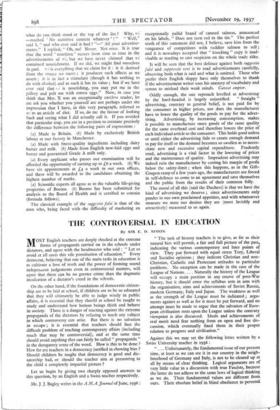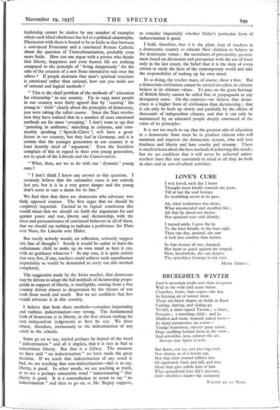THE CONTROVERSIAL IN EDUCATION
By SIR E. D. SIMON
MOST English teachers are deeply shocked at the extreme forms of propaganda carried on in the schools under dictators, and agree with the headmaster who said : " Let us avoid at all costs this vile prostitution of education." Every democrat, believing that one of the main tasks in education is to cultivate a love of truth and the power of forming sound indeperwent judgements even in controversial matters, will agree that there can be no greater crime than the dogmatic inculcation of a dictator's creed in the schools.
On the other hand, if the foundations of democratic citizen- ship are to be laid at school, if children are to be so educated that they will ultimately be able to judge wisely in public affairs, it is essential that they should at school be taught to study and understand how human beings think and behave in society. There is a danger of reacting against the extreme propaganda of the dictators by refusing to teach any subject in which controversy can arise. But there is no salvation in escape ; it is essential that teachers should face the difficult problem of teaching contemporary affairs (including much that may be controversial)„ and at the same time should avoid anything that can fairly be called " propaganda " in the derogatory sense of the word. How is this to be done ? How far are teachers in a democracy justified in showing bias ? Should children be taught that democracy is good and dic- tatorship bad, or should the teacher aim at presenting to the child a completely impartial picture ?
Let us begin by giving two sharply opposed answers to this question, by an English and a Swiss teacher respectively.
Mr. J. J. Bagley writes in the A.M.A.Journal of June, 1936 : " The task of history teachers is to give, as far as their natural bias will permit, a fair and full picture of the past, indicating the various contemporary and later points of view. They put forward with equal stress Tory, Liberal and Socialist opinions ; they indicate Christian and non- Christian, Catholic and Protestant attitudes to particular problems. No exception can be made in the case of the League of Nations. . . . Naturally the history of the League will occupy a main position in any course of post-War history, but it should enter the syllabus arm in arm with the organisation, aims and achievements of Soviet Russia; modern Germany, Italy and Japan. The weakness as well as the strength of the League must be indicated ; argu- ments against as well as for it must be put forward, and no attempt must be made to argue that the salvation of Euro- pean civilisation rests upon the League unless the contrary viewpoint is also discussed. Ideals and achievements of real merit need fear nothing from an open and free dis- cussion, which eventually fixed them in their proper relation to progress and civilisation." - Against this we may set the following letter written by a Swiss University teacher in 1936 : " . . . Unfortunately, the fundamental issue of our present time, at least as we can see it in our country in the neigh- bourhood of Germany and Italy, is not to be cleared up at all by means of clear thinking. Logical arguments are of very little value in a discussion with true Fascists, because the latter do not adhere to the same laws of logical thinking as we do. Their fundamental values are different from ours. Their absolute belief in blind obedience to personal leadership cannot be shaken by any number of examples where such blind obedience has led to a political catastrophe. Discussion with them is bound to be as futile as that between a convinced Protestant and a convinced Roman Catholic about the question of Transubstantiation, • probably even. more futile. How can one argue with a person who thinks that liberty, happiness and even human life are nothing compared to the principle of living dangerously ' for the sake of the creation of a new State intended to rule over the others ? If people maintain that man's spiritual structure is emotional rather than rational, how can you make use of rational and logical methods ?
" This is the chief problem of the methods of ' education for citizenship ' in our country. Up to 1933 most people in our country were fairly agreed that by ' teaching ' the young to ' think ' clearly about the principles of democracy, you were taking the safest course. Since the Nazi revolu- tion they have realised that in a number of cases emotional methods are far more 'sweeping.' I don't want to say that ' parading in uniforms,' marching in columns, and com- munity speaking (` Sprech-Chore ') will have a great future in our country, but they had in Germany, and it is certain that the younger generation in our country is at least heartily tired of ' argument.' Even the Socialists complain of this in regard to their own young generation, not to speak of the Liberals and the Conservatives.
" What, then, are we to do with our ' dynamic ' -young ones ?
" I don't think I know any answer to this question. I certainly believe that the rationalist cause is, not entirely lost yet, but it is in a very grave danger and the young don't seem to care a damn for its fate."
We find then that there are democrats who advocate two flatly opposed courses. The first urges that we should be completely impartial. Carried to its logical conclusion this would mean that we should set forth the arguments for and against peace and war, liberty and dictatorship, with the force and persuasiveness of convinced believers in all of them, that we should say nothing to indicate a preference for Plato over Nero, for Lincoln over Hitler.
But surely nobody would, on reflection, seriously support this line of thought ? Surely it would be unfair to leave the unfortunate child to make up its own mind as best it can, with no guidance whatever ? In any case, it is quite certain that very few, if any, teachers could achieve such superhuman impartiality as would be demanded to carry out this method completely.
The suggestion made by the Swiss teacher, that democrats may be driven to adopt the full methods of dictatorship propa- ganda in support of liberty, is intelligible, coming from a free country driven almost to desperation by the threats of war lords from north and south. But we are confident that few would advocate it in this country.
I believe that both these methods—complete impartiality and ruthless indoctrination—are wrong. The fundamental faith of democrats is in liberty, in the free citizen making his own independent judgements as best he can. We must object, therefore, strenuously to the indoctrination of any creed in the schools.
Some go on to say,' misled perhaps by hatred of the word " indoctrination " and all it implies, that it is just as bad to indoctrinate liberty. But that is a fallacy. The moment we have said " no indoctrination " we have made the great decision. If we teach that indoctrination of any creed is bad, we are teaching that non-indoctrination—that is to say, liberty, is good. In other words, we are teaching as truth, or to use a perhaps unsuitable word " indoctrinating " that liberty is good. It is a contradiction in terms to say " no indoctrination " and then to go on, as Mr. Bagley suggests, to consider impartially whether Hitler's particular form of indoctrination is good.
I hold, therefore, that it is the plain duty of teachers in a democratic country to educate their children to believe in the democratic values : the sacredness of personality, govern- ment based on discussion and persuasion with the use of force only in the last resort, the belief that it is the duty of every citizen to study the facts of the contemporary world and take the responsibility of making up his own mind.
In so doing, the teacher must, of course, show a bias. But a democratic civilisation cannot be carried on unless its citizens believe in its ultimate values. To pass on the great heritage of British liberty cannot be called bias or propaganda in any derogatory sense. On the contrary—we believe that demo- cracy is a higher form of civilisation than dictatorship ; that it can only be built up slowly and painfully by the efforts of thousands of independent citizens, and that it can only be maintained by an educated people deeply convinced of the value of its principles.
It is not too much to say that the greatest aim of education in a democratic State must be to produce citizens who will maintain and improve the democratic system, who will love kindness and liberty and hate cruelty and tyranny. There is much to learn about the best methods of achieving this result ; but we are confident that it will never be achieved unless teachers have this aim constantly in mind in all they do both in class and in out-of-school activities.

















































































































 Previous page
Previous page